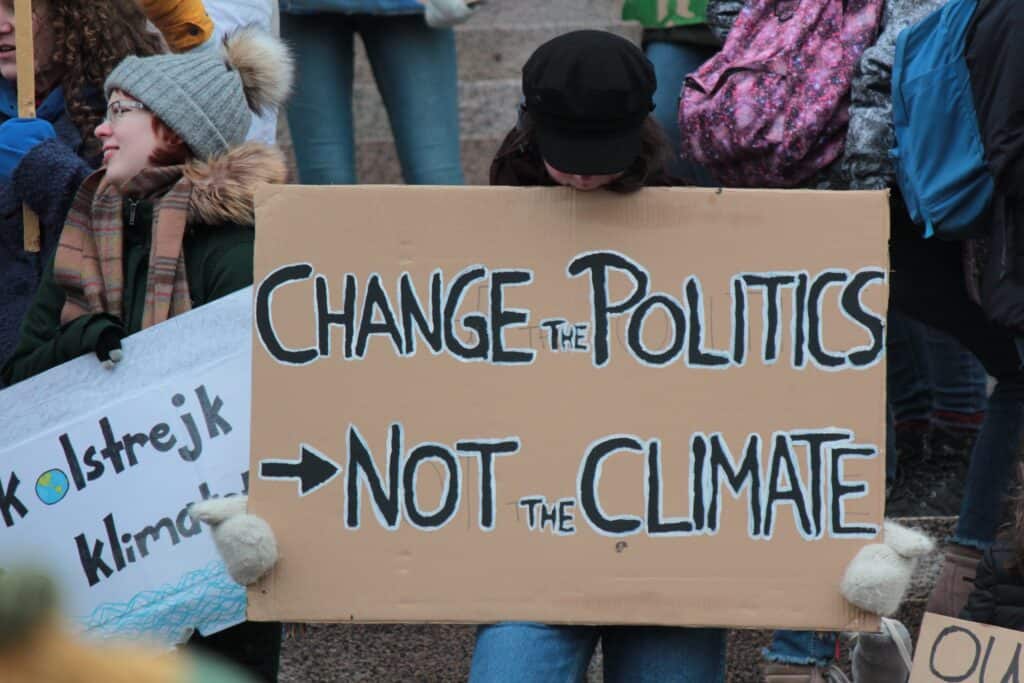In the realm of environmental challenges, the active involvement of young people has emerged as a crucial force in shaping a sustainable future. It raises important questions about the role of the younger generation in tackling these challenges, and whether they feel empowered to make a difference.
To address these questions, the initiative “Youth & Environmental Challenges” was established by Yasmine Rugarli, founder of UR, and Veronica Vianello, co-founder of the “Youth & Environmental Challenges” project. Recently, during a session with the students from the Young Innovators honour program at Utrecht University, the prevailing theme discussed was the sense of concern and uncertainty experienced by young people in relation to environmental challenges. Despite the European Union (EU) taking significant measures to engage and empower youth in environmental issues, a lingering sense of worry remains.

UR wants to shed light on areas of improvement within our governance system: this can only be achieved by ensuring the inclusion of individuals directly affected by current policies. In line with this objective, UR is currently undertaking an empirical study to develop a comprehensive report analyzing the relationship between EU policies aimed at empowering youth in environmental challenges, and the actual connection of young individuals to the subject.
The central question that this research seeks to address is the effectiveness of EU policies and instruments designed to promote youth empowerment in relation to environmental challenges, considering the prevalent experience of eco-anxiety among young people. Through this study, we aim to gain insights into the alignment between EU policies and the actual experiences, concerns, and aspirations of young individuals, ultimately seeking avenues for improvement and enhancement in fostering youth empowerment.
By delving into this topic, we strive to contribute to the ongoing dialogue on youth engagement and empowerment in environmental sustainability. It is our belief that by examining the effectiveness of existing policies and identifying potential areas of improvement, we can work towards a more inclusive and impactful approach to address environmental challenges and empower young people to become agents of change.
Eco-anxiety and feeling disempowerment
In the past few years, a number of reports and research have been conducted on the theme of “eco-anxiety” and “eco-pessimism”. These are emotional responses which arise in individuals as a consequence of experiencing the changes caused by the environmental crisis, and overall by the challenges related to sustainability. Indeed, the term “eco-anxiety” was coined to explain the relationship that people could develop in relation to climate change, often characterized by mental distress and negative emotions.
Young adults, along with other groups of the population, feel extremely threatened by the impact that the climate crisis is having on the earth, and consequently in many aspects of human life.
On this basis, research has proven that the sense of concern risks endangering the mental health of a whole generation, increasing the cases of post-traumatic stress disorder (PTSD), anxiety, depression and cognitive deficits amongst others. Furthermore, the above-mentioned factors endangering the youth’s well-being are currently aggravated by the impact of the Covid-19 health crisis and the current economic crisis.

Moreover, not only do the younger generations feel the danger, causing a deep sense of anxiety, but they are most of the time struggling with a feeling of disempowerment. Most young individuals do not know how they can contribute to the fight against environmental challenges, and they often are held back by a rooted belief that their individual actions are not enough to make an effective change.
In light of the aforementioned problem, we have proceeded to research the currently deployed policy instruments by the European Union.
Current relevant EU policy and instruments
In the realm of EU policies and initiatives, the role of the Youth in participating in environmental challenges is strongly emphasized. Hence, the EU has taken several measures with the intention to engage and empower young people in environmental issues. The following paragraphs will present an overview of the most relevant policies and initiatives upholding the aforementioned goals.

The European Council Resolution on The European Youth Strategy 2019-2027 lays out a comprehensive framework for empowering and supporting young people across Europe. This resolution, commonly known as the EU Youth Strategy, aims to address the needs, aspirations and challenges faced by young generations when playing a role in sustainable development. The strategy centres its efforts on three primary areas of focus, represented by the keywords: Engage, Connect, and Empower. It strives for coordinated implementation across different sectors to achieve its goals.
Overall, the mission of the strategy is implemented via various elements, specifically: Future National Activities Planners (FNAPs), the 11 European Youth Goals, and the EU Youth Dialogue, all aimed at fostering youth development and engagement.
UR’s research
To conduct this research, we have opted for an empirical methodology, which will enable us to gather information directly from a selected sample of young individuals aged between 18 and 30 years old. Specifically, the chosen method entails conducting a survey to obtain qualitative data, involving the collection and analysis of non-numerical information.
Once the survey responses have been collected from the participants, a comprehensive report will be compiled. This report will present an overview of our findings and provide insights into our research question. The primary objective of this project is to examine the fundamental aspects of the relationship between young generations and environmental challenges. Specifically, we seek to explore whether young people perceive themselves as actively engaged in the fight against environmental issues, whether they perceive their contributions as meaningful and valuable, or whether they experience fear and anxiety stemming from a sense of powerlessness.
Moving forward, our investigation will delve into the extent to which the European Union, through the aforementioned instruments and policies, effectively addresses the phenomenon of eco-anxiety among the youth population and fosters their empowerment in addressing environmental challenges.

Our initiative holds significant importance in addressing the pressing environmental challenges we face today. It recognises the critical role that young people play in shaping a sustainable future and seeks to empower them to actively participate in environmental initiatives.
United Rising’s focus on inclusivity is crucial for effective policy-making and implementation. By involving the people directly affected by environmental policies – including young individuals – in the discussions and decision-making processes, the initiative ensures that diverse perspectives and experiences are taken into account. This inclusivity strengthens the legitimacy and effectiveness of environmental initiatives, as it reflects the needs and aspirations of the communities involved.